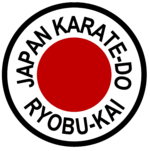Shindō jinen-ryū
 | |
| Date founded | 1933 |
|---|---|
| Country of origin | |
| Founder | Yasuhiro Konishi (1893–1983) |
| Current head | Yasuhiro (Takehiro) Konishi |
| Arts taught | Karate |
| Ancestor arts | Jujitsu |
| Ancestor schools | Karate: Shotokan, Shitō-ryū, Motobu-ryu Jiu-jitsu and Koryu: Takenouchi-ryū, Musō-ryū, Jikishinkage-ryū, Kyōshinmeichi-ryū, Ono-ha Ittō-ryū, Shindō Munen-ryū, Yōshin Koryū, Shiba Shin-Yo-ryu, Fusen-ryu, Yagyu Shingan-ryu. |
| Practitioners | Sho Kosugi, Kiyoshi Yamazaki, Mina Yamazaki, Piston Horiguchi, |
| Official website | Japan Karate-Do Ryobu-Kai |
Shindo Jinen Ryu (神道自然流) is a form of karate that was founded in 1933 by Yasuhiro Konishi (康弘小西, Konishi Yasuhiro).
The Naming of Shindo Jinen Ryu
Konishi believed that if one lives a moral life, then one is naturally following the divine way. Extending this idea, he posited that, if training in karate in a natural way leads one to mastery of one's body, knowledge and experience are vastly increased and the foundation for naturally living a moral life is established. For this reason Konishi named his own style Shindō jinen-ryū ("godly, natural style, complete empty-handed way").[1]
History and development
Prior to learning Karate, founder Yasuhiro Konishi had studied traditional Japanese martial arts at Takenouchi-ryū, Musō-ryū, Jikishinkage-ryū, Kyōshinmeichi-ryū, Ono-ha Ittō-ryū and Shindō Munen-ryū schools. In 1924, he began studying Karate under Gichin Funakoshi, and together with Hironori Otsuka (founder of Wado-ryu Karate), who was also a disciple of Funakoshi, whom with he would conceive practice of competitive Karate.[citation needed]
Subsequently, Konishi learned Karate from Motobu Choki and Kenwa Mabuni (founder of Shito-ryu Karate), and learned Aikido (then Daito-ryu Aikijujutsu) from Morihei Ueshiba. He would additionally learn Nanban Sattō-ryū Kenpō from Seiko Fujita, as well as go study Jiu-jitsu from Yōshin Koryū, Shiba Shin-Yo-ryu, Fusen-ryu, and Yagyu Shingan-ryu.
In 1933, he would compile all the techniques he had learned into Shindō jinen-ryū style. Konishi followed the path of karate and would teach that "Karate is based on the fact that no one hits you and no one hits you."
Characteristics
Shindo Jinen Ryu training has three main elements: kihon (basics), kata (forms or patterns of moves) and kumite (sparring). It incorporates elements of karate, aikido, jujitsu and kendo in its curriculum and also emphasizes both philosophy and education.[2] The strong influences of both Gichin Funakoshi and Kenwa Mabuni are apparent in the style. The catalog of stances and techniques is equally broad, subsuming methods from both Shotokan and Shito-Ryu. There is a strong focus on practicality and an approach that often combines entering strikes with finishing takedowns.
Kata
Shindo Jinen Ryu has a large repertoire of kata, incorporating variations on the Shotokan catalog, a number of Shito-Ryu forms and a number of kata that are exclusive to Shindo Jinen Ryu. Kobudo is also part of this element of the style's curriculum.
| Traditional Katas | Standard Katas | Kobudo | Additional Kata |
|---|---|---|---|
| Tai Sabaki Shodan | Heian Shodan | Suna Kake No Kon | Shisochin |
| Tai Sabaki Nidan | Heian Nidan | Shushi No Kon Dai | Saifa |
| Tai Sabaki Sandan | Heian Sandan | Shushi No Kon Sho | Kururunfa |
| Seiryu | Heian Yondan | Sakugawa No Kon | Tomari Bassai |
| Rohai | Heian Godan | Tozan No Kama | |
| Juroku | Tekki Shodan | Ishimine No Tonfa | |
| Naifanchin | Tekki Nidan | Hama Hi Ga No Tonfa | |
| Anan | Tekki Sandan | Ishimine No Sai | |
| Chatan Yara No Koshokun | Bassai Dai | Tsuken Shita Ha Ku No Sai | |
| Nipaipo | Bassai Sho | Hama Hi Ga No Sai | |
| Pinan Shodan | Kanku Dai | Tawa Ta No Sai | |
| Pinan Nidan | Kanku Sho | Chatan Yara No Sai | |
| Pinan Sandan | Empi | Ya Ka No Sai | |
| Pinan Yondan | Jitte/Jutte | Ha Ni Tagawa No Sai | |
| Pinan Godan | Jiin | Jigen No Sai | |
| Suparimpei | Jion | Kojo | |
| Gankaku | |||
| Hangetsu | |||
| Nijushiho | |||
| Sochin | |||
| Chintei | |||
| Sanchin | |||
| Seipai | |||
| Unsu | |||
| Gojushiho Dai | |||
| Gojushiho Sho | |||
| Seienchin |
Organization
Currently, Shindo Jinen-ryu has 15 branches in Japan and 15 overseas branches as the Japan Karatedo Ryobukai, and is active.
The Ryobukan Konishi Dojo of the Ryobukai General Headquarters was established by Yasuhiro Konishi, in 1927, before the founding of Shindo Jinen-Ryu. It has been used as a dojo for youth development before and after the war as a dojo for kendo, karate, and judo.
Following Yasuhiro Konishi's death on June 3, 1983, his eldest son, Takehiro Konishi, succeeded the second Soke.
In March 1985, the main dojo moved to KN Building at Shiba, Minato-ku, Tokyo. According to the "Monthly Karatedo" magazine[citation needed] specializing in karate, the Japanese domestic branches gather every year to hold the Ryobukan Tournament.
Sources
- Japanese Karate, Volume 1: Shindo Jinen Ryu. [Motion Picture]. Thousand Oaks, CA: Tsunami Productions. 1998
- Japanese Karate, Volume 2: Ryobukai and Shotokan. [Motion Picture]. Thousand Oaks, CA: Tsunami Productions. 1998
- Japan Karate-Do Ryobu-Kai Instructors Manual. 1996
References
- ^ Shindo Jinen-Ryu by Howard High at Dragon Times
- ^ Welcome! at Japan Karate-Do Ryobu-Kai Saint Louis
